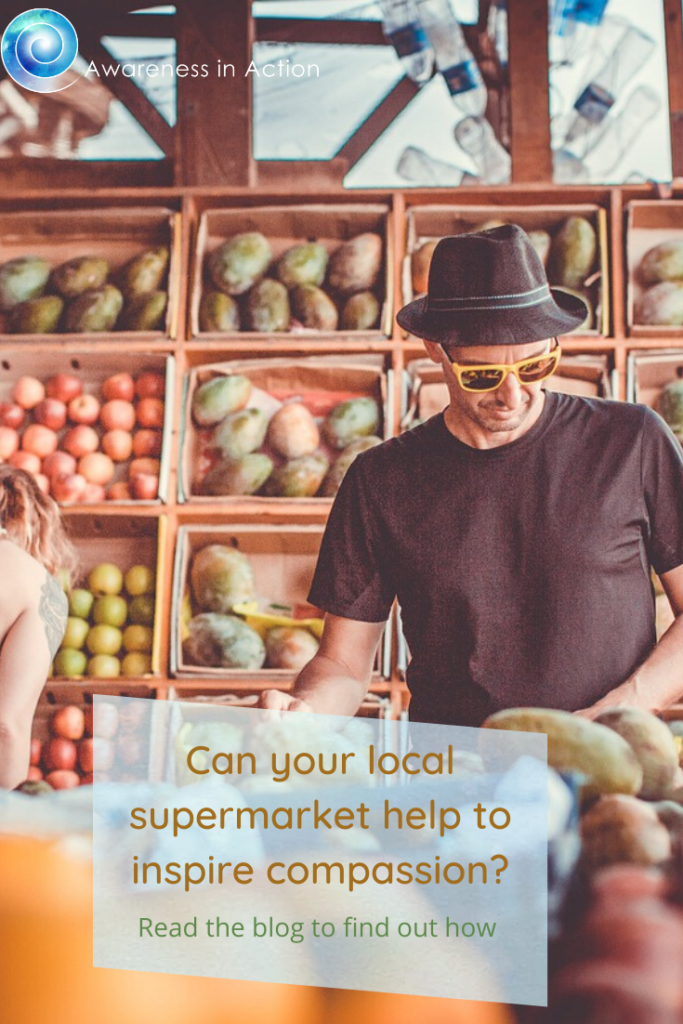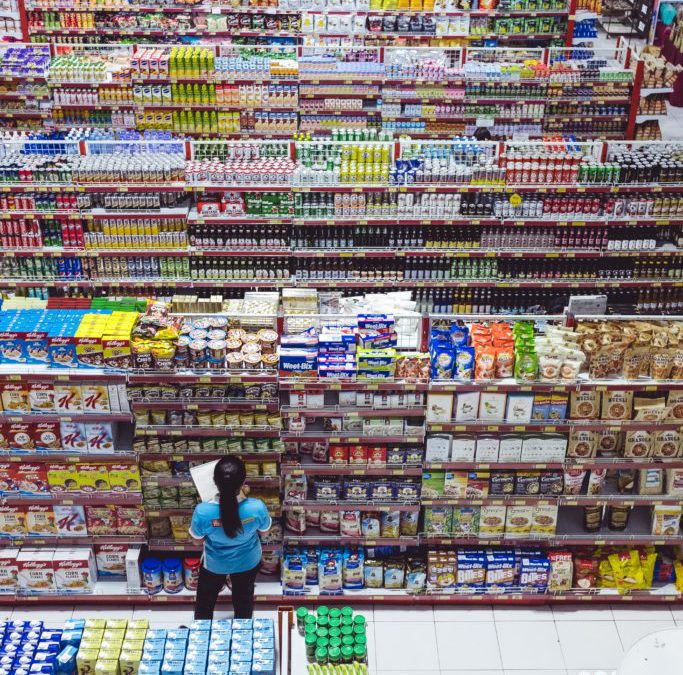When you are pushing your trolley round your local supermarket doing the weekly shop, perhaps compassion is not the main thing on your mind. It’s quite likely that you are focused on finding everything on your list and getting home as soon as you can.
I can sympathise.
However, recently I have been trying to look at my supermarket trips in a different light. It’s been an inspiration to discover the extent to which my local supermarket can inspire compassion.
The abundance of goods from all over the world
I live in Amsterdam. It’s a diverse city and its supermarkets reflect this in their range of goods. I have been playing a kind of game where I choose an item on display. Then I try and trace back how it got to this shelf, in this supermarket, in this city. The results are more impressive than I expected.
Our oranges have lately been coming from Spain—not so far away, you might think. However, once you start the process—the orchard where the oranges are grown, the family who own the orchard, the workers who pick the fruit and their families, the trucks that transport the fruit—all just to get the oranges to Holland. Then there is all the activity that will happen here to get them to the supermarket. There are the advertisers, the marketing experts, the financial people and the distributors. Finally, there are the people who work in the local supermarket loading the shelves.
If you want to take the game to an even more detailed level, you can include the people who make the clothes of all the people involved, who build the vehicles that get them to work, who farm the food they have eaten for breakfast.
In fact, there is no end to the game and that is with just one item. We could move on to soy sauce, or tinned pineapples!
You may be wondering, what has this got to do with compassion?
Isolating ourselves
One of the ways we can respond to stress isby standing our ground and fighting back. When this becomes exhausting, or we have met with a few defeats we tend to withdraw to lick our wounds and if we are not careful this can turn into a kind of self-isolation. When we isolate ourselves the tendency to ruminate on our problems increases. It can be easier to get our challenges out of proportion and to feel things are against us. If we have low social connection, it can be worse for our health than smoking, high blood pressure, or obesity. It can mean we recover more slowly from illness.
Generally speaking, human beings thrive on connection.We need the interaction with other people and the insights that brings. We can learn to regulate our emotions more successfully and increase our self-esteem. In fact, social connection creates a positive feedback loop of social, emotional and physical wellbeing.
Allowing ourselves to feel our connection with others,rather than keeping ourselves separate is an important element of compassion. Using the goods in the supermarket to reach out to hundreds, if not thousands of other people helps to build an awareness of the people who impact our lives. This awareness can open our hearts more and enable us to see the importance of other people’s needs.
Connection and our local supermarket.
It’s all too easy as we hurry to get our shopping done to find people irritating, to judge their behaviour and to form negative opinions of them. Maybe you find small children running around in supermarkets a challenge, or the people who stand for ages with their trolleys parked across the aisle you are trying to negotiate. Personally, it’s easy for me to get annoyed by supermarket staff reloading shelves, with their big packages getting in the way.
I have been focusing lately on one very young man who has recently started working in our local supermarket. He is small, and young looking for his age. He can’t have left school very long ago. When he started, he was clumsy and often in my way and I found myself tutting and sighing. However, as the weeks have passed, he has shown himself to be responsible and hard-working. I see his mates drop by sometimes to tease and distract him, but he won’t have it. He sends them away. I have seen him stretch to get packages of milk for old ladies who cannot reach them and to run after a mother with a toddler in her buggy, who had dropped something and not seen it. He has real pride in what many would see as a low-skill job. It brought home to me that once you make the effort to connect with someone and not just see them as ‘the shelf-stacker’, or the ‘check-out assistant’, a whole different level of connectionopens up that is rewarding and enriching.
It turns out that supermarkets don’t just connect you to all the many people who have brought the goods near enough for you to buy but also to all the people from your neighbourhood who work there and shop there.
Taking time to smile at other people
Did you know that smiling is good for you? It turns out that even just putting your lips into the form of a smile will help to raise your level of wellbeing.
I have started consciously trying to make eye contact with other shoppers and to smile at them. Most of the time I get a great response—a friendly smile back, sometimes even a word or two.
Compassion for me grows in lots of small, accessible ways. It does not come from great aspirations and good intentions alone. It’s all too clear to me that my evolutionary history and social conditioning have helped to create habits that have more to do with protecting my self-interest than reaching out to other people. I like to think that I am chipping away at these habits on a daily basis by training myself to see differently, to be more aware of other people and to recognise the power of a smile.
We have more in common than we think
Once we start to become more aware of other people and to allow them in, it does not take long to see how interdependent we all are. Each time I watch the news and think about the stories that are trending, it comes home to me how, despite our differences, we all want the same basic things. We all want to live happy lives and avoid pain and suffering and yet again and again, we see that happiness is not so easy to find and suffering is inevitable.
In addition, events that happen in seemingly distant places can impact us strongly. Think of a lorry drivers’ strike in France and how that can have ramifications all over Europe, as roads get blocked and supermarket stocks get low. There are an historic number of misplaced people on the planet just now because of war and famine. Think of all the interwoven effects of those people trying to find safety and a new life.
The classical African concept of Ubuntuencapsulates these ideas. Archbishop Desmond Tutusays that Ubuntu refers to the fact that you cannot be human in isolation, that we are all inter-connected.
In Mahayana Buddhismthere is the idea of Indra’s net—an infinite web that holds the universe. At each place where the threads of the web cross there is a jewel, which reflects all the other jewels.
All this points out that simply seeking your own happiness, without taking other people into account is out of step with how the world works. Our own happiness is bound up with the happiness and wellbeing of everyone else. We are all in this together and can only thrive when we act with that understanding. This is how compassion works.
So, we return to our local supermarket, where we can see that, if we pay just a little more attention, we have plenty of opportunities to foster connection and inspire compassion. The people who produce the food we are buying, the staff in the store, our fellow shoppers are all like us in so many ways. Because our actions can affect each other in countless ways, compassion becomes an essential ingredient in how we are together. Developing compassion means coming to respect interdependence and what it shows us about how we live together on this planet.


